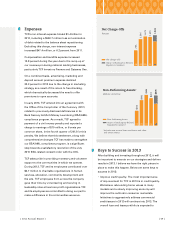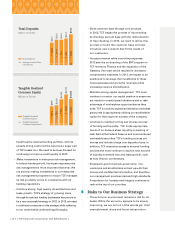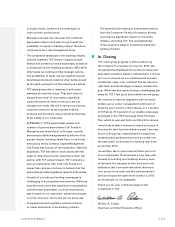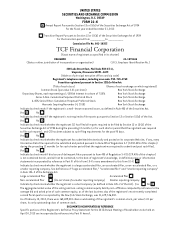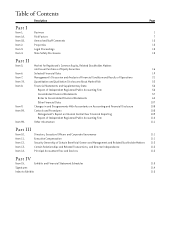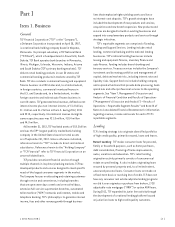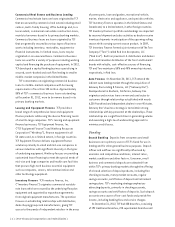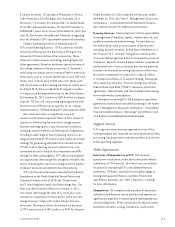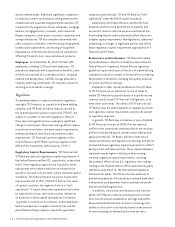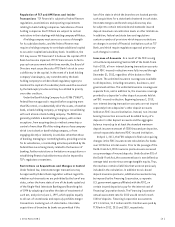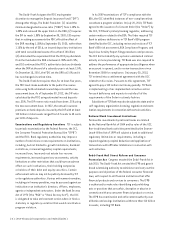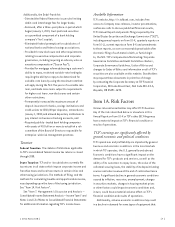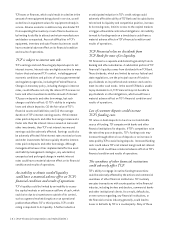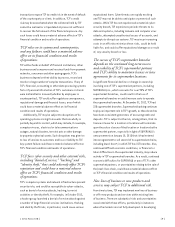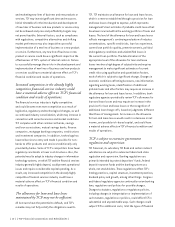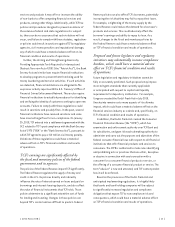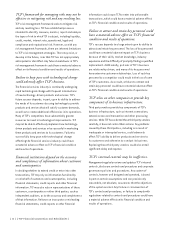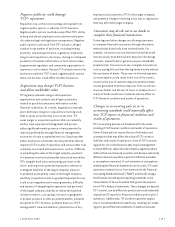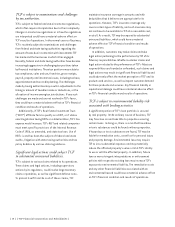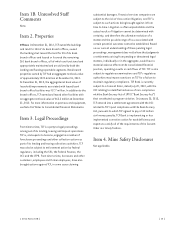TCF Bank 2012 Annual Report Download - page 21
Download and view the complete annual report
Please find page 21 of the 2012 TCF Bank annual report below. You can navigate through the pages in the report by either clicking on the pages listed below, or by using the keyword search tool below to find specific information within the annual report.Regulation of TCF and Affiliates and Insider
Transactions TCF Financial is subject to Federal Reserve
regulations, examinations and reporting requirements
relating to bank holding companies. Subsidiaries of bank
holding companies like TCF Bank are subject to certain
restrictions in their dealings with holding company affiliates.
A holding company must serve as a source of strength
for its subsidiary banks, and the Federal Reserve may
require a holding company to contribute additional capital
to an under-capitalized subsidiary bank. In addition, the
OCC may assess TCF Financial if it believes the capital of TCF
Bank has become impaired. If TCF Financial were to fail to
pay such an assessment within three months, the Board of
Directors must cause the sale of TCF Bank’s stock to cover
a deficiency in the capital. In the event of a bank holding
company’s bankruptcy, any commitment by the bank
holding company to a federal bank regulatory agency to
maintain the capital of a subsidiary bank would be assumed
by the bankruptcy trustee and may be entitled to priority
over other creditors.
Under the Bank Holding Company Act of 1956 (“BHCA”),
Federal Reserve approval is required before acquiring more
than 5% control, or substantially all of the assets, of another
bank, or bank holding company, or merging or consolidating
with such a bank or bank holding company. The BHCA also
generally prohibits a bank holding company, with certain
exceptions, from acquiring direct or indirect ownership or
control of more than 5% of the voting shares of any company
which is not a bank or bank holding company, or from
engaging directly or indirectly in activities other than those
of banking, managing or controlling banks, providing services
for its subsidiaries, or conducting activities permitted by the
Federal Reserve as being closely related to the business of
banking. Further restrictions or limitations on acquisitions or
establishing financial subsidiaries may also be imposed by
TCF’s regulators or examiners.
Restrictions on Acquisitions and Changes in Control
Under federal law, interstate merger transactions may
be approved by federal bank regulators without regard to
whether such transactions are prohibited by the law of any
state, unless the home state of one of the banks opted out
of the Riegle-Neal Interstate Banking and Branching Act
of 1994 by adopting a law after the date of enactment of
such act, and prior to June 1, 1997, which applies equally
to all out-of-state banks and expressly prohibits merger
transactions involving out-of-state banks. Interstate
acquisitions of branches by banks are permitted if the
law of the state in which the branches are located permits
such acquisitions for a state bank chartered in such state.
Interstate mergers and branch acquisitions may also
be subject to certain nationwide and statewide insured
deposit maximum concentration levels or other limitations.
In addition, federal and state laws and regulations
contain a number of provisions which impose restrictions
on changes in control of financial institutions such as TCF
Bank, and which require regulatory approval prior to any
such changes in control.
Insurance of Accounts As a result of the FDIC issuing
a Final Rule implementing Section 343 of the Dodd-Frank
Act in 2010, all non-interest bearing transaction accounts
at all FDIC-insured institutions were fully insured through
December 31, 2012, regardless of the balance of the
account. The unlimited insurance coverage was available
to all depositors, including consumers, businesses, and
government entities. This unlimited insurance coverage was
separate from, and in addition to, the insurance coverage
provided to a depositor’s other deposit accounts held at
an FDIC-insured institution. Beginning January 1, 2013,
non-interest bearing transaction accounts are not insured
separately from a depositor’s other deposit accounts
held at an FDIC-insured institution. Instead, non-interest
bearing transaction accounts will be added to any of a
depositor’s other deposit accounts and the aggregate
balance insured up to at least the standard maximum
deposit insurance amount of $250 thousand per depositor,
at each separately chartered FDIC-insured institution.
On April 1, 2011, the FDIC adopted a final rule requiring
changes in the FDIC insurance rate calculations for banks
over $10 billion in total assets. Prior to the passage of the
Dodd-Frank Act, FDIC insurance premiums were assessed
as a percentage of insured deposits. Under Section 331 of
the Dodd-Frank Act, the assessment base is now defined as
average total assets minus average tangible equity. Thus,
the new base contains liabilities that were not previously
included in the calculation. In addition to risk-based
deposit insurance premiums, additional assessments may
be imposed by the Financing Corporation, a separate
U.S. government agency affiliated with the FDIC, on
certain insured deposits to pay for the interest cost of
Financing Corporation bonds. The Financing Corporation
annual assessment rate for 2012 was 66 cents for each
$100 of deposits. Financing Corporation assessments
of $1.1 million, $1.2 million and $1.2 million were paid by
TCF Bank in 2012, 2011 and 2010, respectively.
{ 2012 Form 10K } { 5 }


